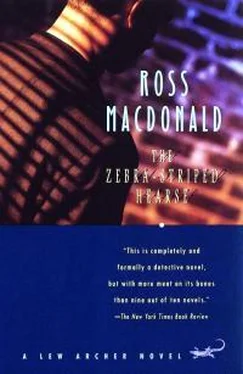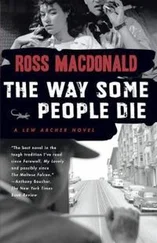“The Jaimet house?”
She made a gesture in the direction of the road. “I’m talking about that same house. Jim Rowland bought it from Mrs. Jaimet after her husband died. It was the original Jaimet ranch house. This whole west side of town used to be the Jaimet ranch. But that’s all past history.”
“Tell me about Jim Rowland.”
“There’s nothing much to tell. He’s a good steady man, runs the Union station up the road, and he’s opening another station in town. Jack always swears by Rowland. He says he’s an honest mechanic, and that’s high praise from Jack.”
“Did Dolly know him?”
“Naturally she knew him. The Rowlands lived across the street for the last three-four years. If you think it went further than that, you’re really off. Jim’s a good family man. Anyway, he sold to the State and moved out the first of the year. He wouldn’t come back and bury a body in his own yard, if that’s what you’re thinking.”
I was thinking that you never could tell what murderers would do. Most of them were acting out a fantasy which they couldn’t explain themselves: destroying an unlamented past which seemed to bar them from the brave new world, erasing the fear of death by inflicting death, or burying an old malignant grief where it would sprout and multiply and end by destroying the destroyer.
I thanked Mrs. Stone for her trouble and walked across the road. The earth movers had stopped for the day, but their dust still hung in the air. Through it I could see uprooted trees, houses smashed to rubble and piled in disorderly heaps. I couldn’t tell where Rowland’s house had stood.
THE DEPUTY on duty at the Citrus Junction courthouse was a tired-looking man with his blouse open at the neck and a toothpick in his mouth. A deep nirvanic calm lay over his office. Even the motes at the window moved languidly. The ultimate slowdown of the universe would probably begin in Citrus Junction. Perhaps it already had.
I asked the tired man where Sergeant Leonard was. He regarded me morosely, as if I’d interrupted an important meditation.
“Gone to town on business.”
“Which town?”
“L. A.”
“What business?”
He looked me over some more. Perhaps he was estimating my Bertillon measurements. He belonged to the Bertillon era.
“Anything to do with the Simpson case?” I said.
He removed his toothpick from between his teeth and examined it for clues, such as toothmarks. “We don’t discuss official business with the public. You a newspaper fellow?”
“I’m a private detective working with Leonard on the Simpson case.”
He was unimpressed. “I’ll tell the Sergeant when he comes in. What’s your name?”
“S. Holmes.”
He reinserted his toothpick in his mouth and wrote haltingly on a scratch pad. I said: “The ‘S.’ stands for Sherlock.”
He looked up from his laborious pencil work. The old crystal set he was using for a brain received a faint and far-off signal: he was being ribbed.
“What did you say the first name was?”
“Sherlock.”
“That supposed to be funny? Ha ha,” he said.
I started over: “My name is Archer, and Leonard will want to see me. When are you expecting him back?”
“When he gets here.”
“Oh, thanks.”
“You’re welcome.” He tore up the paper he had been writing on and let the pieces flutter down onto the counter between us.
“Can you give me Leonard’s home address?”
“Sure I can. But you’re the great detective. Find it for yourself.”
Archer the wit. Archer the public relations wizard. I took my keen sense of humor and social expertise for a walk down the corridor. There was nobody at the information desk inside the front door, but a thin telephone directory was chained to the side of the desk. Wesley Leonard lived on Walnut Street. An old man watering the courthouse chrysanthemums told me where Walnut Street was, a few blocks from here. Archer the bloodhound.
It was a middle-middle-class street of stucco cottages dating from the twenties. The lawn in front of Leonard’s cottage was as well kept as a putting green. A stout woman who was not so well kept answered the door.
Pink plastic curlers on her head gave her a grim and defiant expression. She said before I asked: “Wesley’s not here. And I’m busy cooking supper.”
“Do you know when he’ll be back?”
“He’s generally home for supper. Wesley likes a good hot supper.”
“What time would that be?”
“Six. We eat an early supper.” Supper was a key word in her vocabulary. “Who shall I tell him?”
“Lew Archer. I’m the detective who brought Vicky Simpson here last Monday night. Is Mrs. Simpson still with you?”
“No. She only stayed the one night.” The woman said in a sudden gush of confidence: “Wesley’s such a good Samaritan, he doesn’t realize. Are you a real good friend of Mrs. Simpson’s?”
“No.”
“Well, I wouldn’t want to insult her. She has her troubles. But it’s hard on an older woman having a younger woman in the house. A younger woman with all those troubles, it puts a strain on the marriage.” She ran her fingers over her curlers, as if they were holding the marriage precariously together. “You know how men are.”
“Not Wesley.”
“Yes, Wesley. He’s not immune. No man is. ” She looked ready to be disappointed in me at any moment. “Wesley was up half the night letting her cry on his shoulder. Heating milk. Making a grilled cheese sandwich at four A.M. He hasn’t made me a sandwich in ten years. So after she woke up at noon and I gave her her lunch I tactfully suggested that she should try the hotel. Wesley says I acted hardhearted. I say I was only heading off trouble in the marriage.”
“What’s she using for money?”
“Her boss wired her an advance on her wages, and I guess the boys in the courthouse chipped in some. Mrs. Vicky Simpson is comfortably ensconced.”
“Where?”
“The Valencia Hotel, on Main Street.”
It had stood there for forty or fifty years, a three-story cube of bricks that had once been white. Old men in old hats were watching the street through the front window. Their heads turned in unison to follow my progress across the dim lobby. It was so quiet I could hear their necks, or their chairs, creak.
There was nobody on duty at the desk. I punched the handbell. It didn’t work. One of the old men rose from his chair near the window and shuffled past me through a door at the back. He reappeared behind the desk, adjusting a glossy brown toupee which he had substituted for his hat. It settled low on his forehead.
“Yessir?”
“Is Mrs. Simpson in?”
He turned to inspect the bank of pigeonholes behind him. The back of his neck was naked as a plucked chicken’s.
“Yessir. She’s in.”
“Tell her there’s someone who wants to speak to her.”
“No telephone in her room. I guess I could go up and tell her,” he said doubtfully.
“I’ll go. What’s her number?”
“Three-oh-eight on the third floor. But we don’t like gentlemen visitors in a lady’s room.” Somehow his toupee made this remark sound lowbrow and obscene.
“I’m no gentleman. I’m a detective.”
“I see.”
He and his friends by the window watched me go up the stairs. I was the event of the day. A red bulb lit the third-floor corridor. I tapped on the door of 308.
“Who is it?” Vicky said in a dull voice.
“Lew Archer. Remember me?”
Bedsprings made a protesting noise. She opened the door and peered out. Her face had thinned.
“What do you want?”
“Some talk.”
“I’m all run out of talk.”
Her eyes were enormous and vulnerable. I could see myself mirrored in their pupils, a tiny red-lit man caught in amber, twice.
Читать дальше












